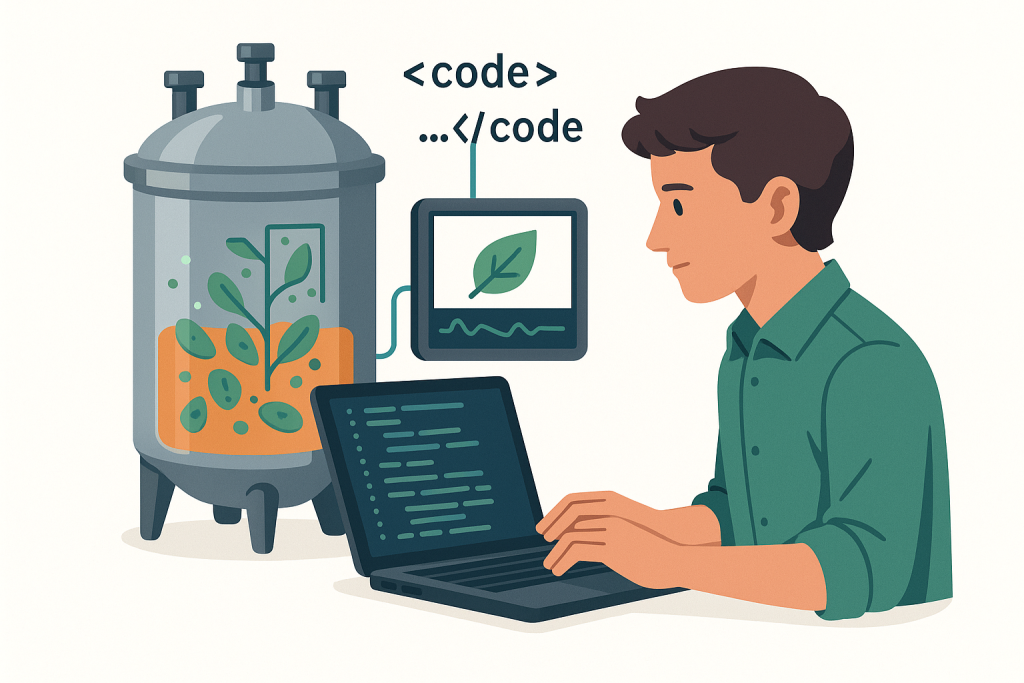Tomorrow’s farmers won’t drive tractors—they’ll manage ecosystems of code and cells.
The Changing Face of Farming
Agriculture has always been defined by tools—plows, irrigation systems, fertilizers. Each wave of innovation made it possible to feed more people with fewer resources. Now, a new revolution is underway, one that doesn’t depend on land or weather.
Bioreactors—machines that grow cells, proteins, or microbes in controlled environments—are redefining what it means to “farm.” The next generation of agricultural workers won’t sow seeds in soil; they’ll cultivate biology through data.
What Is Bioreactor Literacy?
Bioreactor literacy is the ability to understand, operate, and optimize biological growth systems using digital tools. It blends biology, coding, and systems thinking into a single skill set.
Just as traditional farmers needed to understand weather, soil, and machinery, future farmers will need to grasp:
- How cells grow and respond to environmental cues.
- How to program sensors and automation software to control those conditions.
- How to interpret data feedback loops that determine yield and quality.
In short, bioreactor literacy is digital farming for living systems.
The Rise of the “Biofactory”
Cultivated meat, precision fermentation, and microbial agriculture all rely on bioreactors. Instead of raising livestock or planting acres of grain, food can be grown inside stainless-steel tanks that mimic the natural processes of cells.
These biofactories can exist anywhere—urban warehouses, schools, or shipping containers. They produce milk without cows, coffee without beans, and protein without farmland.
Managing them requires fluency not in manual labor, but in biological computation.
Why Students Need to Learn It Now
For parents and educators, the key message is this: agriculture is becoming a STEM field. Bioreactor literacy is to 21st-century food systems what mechanical literacy was to the Industrial Revolution.
Students who understand how to control biological and digital systems will be the next agricultural leaders. Future “farmers” may come from computer science, bioengineering, or data analytics rather than rural communities.
This shift opens the door to a more diverse generation of agri-innovators—urban coders, environmental scientists, and digital designers building sustainable food systems from the ground up.
From Soil to Software: The New Skill Set
The foundation of future farming includes:
- Biological Systems Knowledge: Understanding cell metabolism, nutrient cycles, and microbial interactions.
- Coding and Automation: Programming sensors, managing machine learning models, and maintaining system uptime.
- Data Analytics: Interpreting growth curves, predicting yield, and adjusting variables in real time.
- Ethics and Sustainability: Balancing innovation with ecological and cultural impact.
These skills make “farming” more like managing a living algorithm—a partnership between life science and technology.
Classrooms as Mini-Biofactories
Educators can prepare students by transforming classrooms into micro-labs where biology meets computation. Projects might include:
- Simulating fermentation or cellular growth with open-source software.
- Building small-scale bioreactors using sensors and Arduino kits.
- Exploring food ethics and sustainability through hands-on biotechnology.
This hands-on approach teaches critical thinking and system design—skills that transcend agriculture and apply to medicine, energy, and environmental restoration.
Opportunities for Developing Regions
For developing countries, bioreactor literacy could democratize food production. Instead of importing agricultural equipment or relying on unstable climates, local communities could produce food, medicine, or biofertilizers using modular bioreactor systems.
In this model, the most valuable resource isn’t land—it’s knowledge. And knowledge can be shared anywhere with internet access.
Ethical Considerations
As biology becomes programmable, educators must also teach responsibility. Questions like “Who owns a food cell line?” or “How do we prevent biotechnological monopolies?” will shape the policies of future food systems.
Embedding ethics into bioreactor literacy ensures that innovation remains equitable, transparent, and sustainable.
Preparing the Next Generation of Food Technologists
Parents should encourage curiosity at the intersection of science and technology—robotics, microbiology, environmental systems. Schools should foster partnerships with biotech startups, urban farms, and research labs.
The jobs of the future may not look like farming, but they’ll feed the world just the same.
Conclusion: From Fields to Feedback Loops
The next generation of agriculture will be powered not by tractors, but by data and design. As food becomes a system managed by biology and computation, bioreactor literacy will define who leads in feeding the planet.
In the 20th century, we learned to farm the Earth.
In the 21st, we’ll learn to farm life itself.


